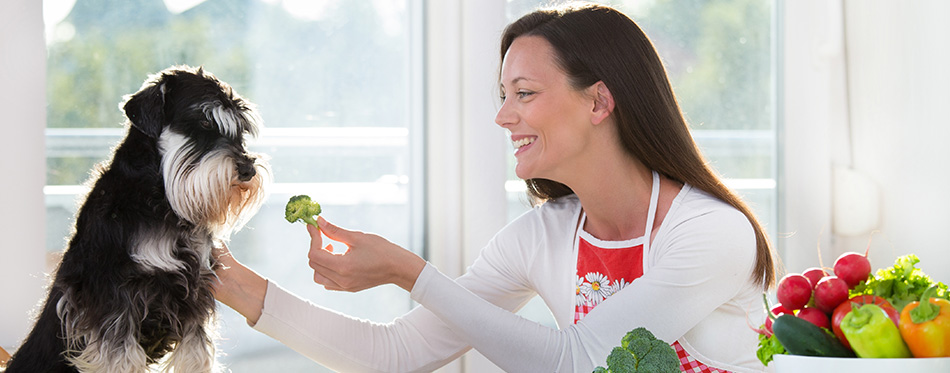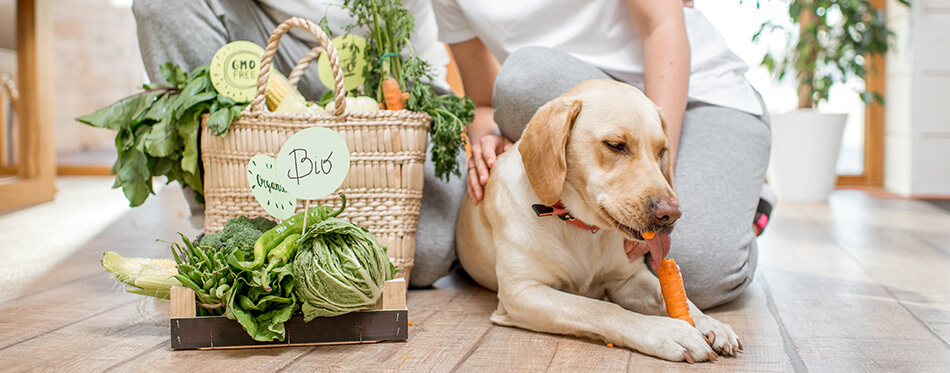Although the short answer is yes, the longer answer will take some time to get through. Not all pups have the ability to stay healthy while being vegan, and it has a lot to do with their breed, genetics, and how healthy their own body is. Having your dog go vegan isn’t like feeding them raw food or changing up their diet to include more vegetarian-friendly items. A vegan diet, for dogs, is a huge change.
Can Dogs go Vegan?
Vegan diets can be suitable for a range of dogs, though some breeds may take to a meat-free diet better than others. There are a huge number of doggy diets out there that focus on the use of animal products as ingredients, but as more humans have become vegan, the rise in vegan diets for domestic pets has reared its head.
Today’s domestic dogs aren’t as carnivorous as their ancestors were. In fact, our puppies are now omnivores and will happily eat either meat or vegetables with little discrimination. There are, of course, some fruits and vegetables that dogs can’t tolerate. But isn’t that exactly the same with humans?
Dogs can be vegans as long as the diet their pet parents put them on covers a nutritionally balanced set of meals with the right amino acids, vitamins, and minerals.

Should Dogs be Vegan?
There’s a lot of debate over whether or not dogs should be vegan, even though they can be. Dogs have the potential to go off animal products and eat meat-free diets without any issues, but the usual argument stems from whether it’s okay to force a dog to be vegan when they can’t make the choice themselves.
Beyond the doggy ethics of that particular argument, a dog owner should consider the dangers of changing their dog’s diet in this way. Not all dogs can digest plant material as well as others, so you could be taking a risk with your dog’s health by switching their diet from animal proteins and animal byproducts to a plant-based diet.
Can Dogs be Vegetarian?
Vegetarianism in dogs does meet a few more of their nutritional needs than a vegan diet will. Most pups will be fine on a vegetarian diet because the potential for missing vital proteins and vitamins is lessened.
Collagen, elastin, and keratin are all vital proteins that your dog needs, and they usually get them from animal products. The easiest place for your dog to find them is from dog food that has been a part of the meat industry, but they can also be found in dairy products. Vegetarian dog food tends to be high-protein food that works for dogs and cats, and still contains some of the crucial animal protein products that a vegan diet won’t give your pup.
The Impacts of a Vegetarian or Vegan Diet on a Dog
Without certain proteins that your dog gets when they consume meat and animal products, your dog has the potential to become incredibly ill. To combat this, dog owners often supplement the diet of their vegan dog with food supplements that help make up what they lose by eating a vegan diet.
Dogs enjoy food. They can certainly get the nutrition they need from a well-put-together vegan meal, as long as all of their essential nutrients are accounted for. Pet nutrition is vastly different from the food we use for human consumption. When you take away the protein and nutrition your dog needs by putting them on a vegan diet without calculating their diet properly, you’re putting them on a one-way track to health problems galore.
A diet lacking in proper nutrition can lead to:
- Malnourishment
- Aching joints
- Weight loss
- Muscle loss
- Inadequate nutrition
- Imbalance of amino acids
- Digestive issues
Why do Some Owners Want Vegan Dogs?
Vegan pet owners often try to change their pet’s diet because they believe that if they can be vegan, their dog should be, too. But the difference between humans and dogs is that dogs are carnivorous, while humans are not. Pet parents who try to force their pups to go vegan should really question whether or not it’s the right choice for their dogs.
There isn’t too much difference between a vegetarian diet and a vegan diet for a canine because many dogs don’t tolerate dairy anyway. Plant-based diets may not work for dogs that have sensitive stomachs, and they take a lot of work to change the way your dog eats into something you find more acceptable.
Ask yourself why you want your pets on meat-free diets. Is it the idea of handling meat? Are you worried about mass-produced pet food? Or do you want your pup to be vegan because you are? Your answer will reveal whether or not this is the right choice for your dog, or if it’s a choice you’re making for your dog without taking their livelihood into account.
Other reasons owners like putting their animals on vegan diets are because of the environmental impacts that the meat and dairy industries have on the world. That’s another huge argument that we won’t go into, but everyone should agree that a dog should only go vegan for their own health, and for no other reason.
Can a Dog on a Meat-free Diet Eat Meat?
That sounds like a weird question, we know. After a canine has been eating vegan pet foods or their owner has been feeding them a vegan/vegetarian diet for some time, can they eat meat again?
They can! It’ll take some time for their digestive system to fall back into its old habits, but it’s similar to transitioning a dog from one dog food to another. Build up the amount of meat from a very small piece to what you would usually feed a dog, and do it over several days. Eventually, your dog should be able to tolerate meat again.
However, if it’s been a while since raw protein like meat has been part of your dog’s diet, you may find that they struggle with it. Like plant matter, raw meat isn’t easily digestible for some dogs. Try cooking the meat, keep it plain, and let your animals go at their own pace.
The Benefits of a Plant-based Diet for Your Dog
As we’ve mentioned, our domestic dogs aren’t true carnivores like their ancestors were, so let’s look at some of the great benefits of missing the animal protein and trying your pup on the plant life:
- Fewer digestive problems (having digestive issues on a plant-based meal plan is rare, even for dogs)
- Lower risk of heart disease
- Less smelly stool
- Better for the environment
- Reduced risk of cancer
- Reduced risk of hypothyroidism
- Lower risk of gout
- Natural anti-inflammatory properties
- Longer life
Finding a Vegan Pet Food
When you’re searching for pet food that is based on plants and not animal products, be sure that you’re checking the nutritional values of the food against the recommended daily needs of a dog that is your pet’s size.
In some countries, the Animal Welfare Act comes into play. This states that you must feed your pet an appropriate diet that meets their needs. You can feed your dog meat, vegetables, fruit – all that good stuff! But their food intake must keep them in good health.
Some vegan pet food does not meet the standards that the Association of American Feed Control Officials requires. This can make shopping around for the right food more difficult, but it’s not impossible to find suitable and high-quality food for your canine.

FAQ’s:
Q: Are there any vegan dog food products?
A: Thankfully, there are several pet food products in the industry that are vegan. These are great for beginning the journey of making your dog vegan because you can avoid the potholes of not giving them a balanced and nutritional diet. Processed food isn’t inherently bad, and a veterinary nutritionist can help you find a good food with everything your dogs require in their diet. There are even vegan dog treats available!
Q: Can cats go on meat-free diets?
A: Like dogs, cats can also be fed plant-based meals with little issue. Many animals eat vegetarian or fully plant-based diets and all are perfectly healthy. The goal is to ensure that your pet is getting all of the nutrients they need in their food, no matter what kind of food you’re feeding them.
Q: Do dogs live longer when they eat plants?
A: There is some evidence that pups on plant-based diets do live longer than canines who stick to eating other animals. There are plenty of benefits to eating plants, and this kind of diet can often aid in keeping your dog healthy. Think of the giant panda, who is also part of the carnivore family, yet only eats bamboo. They live long, happy, and healthy lives.

